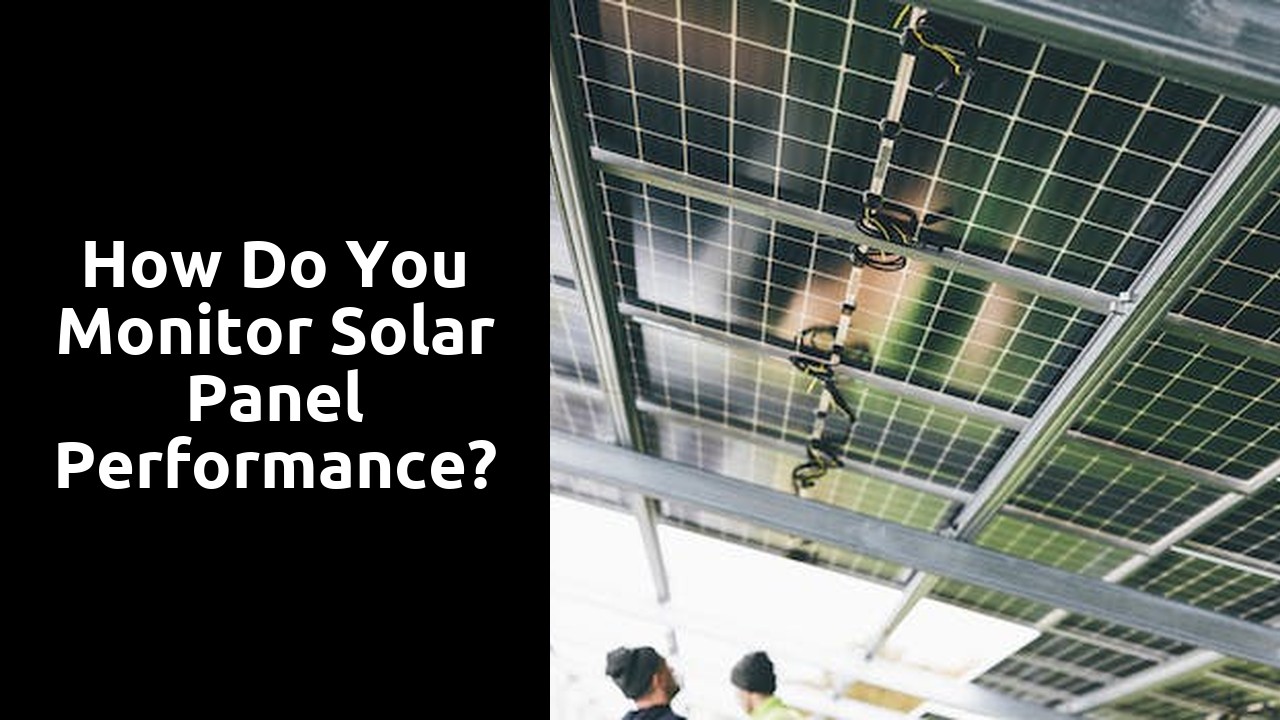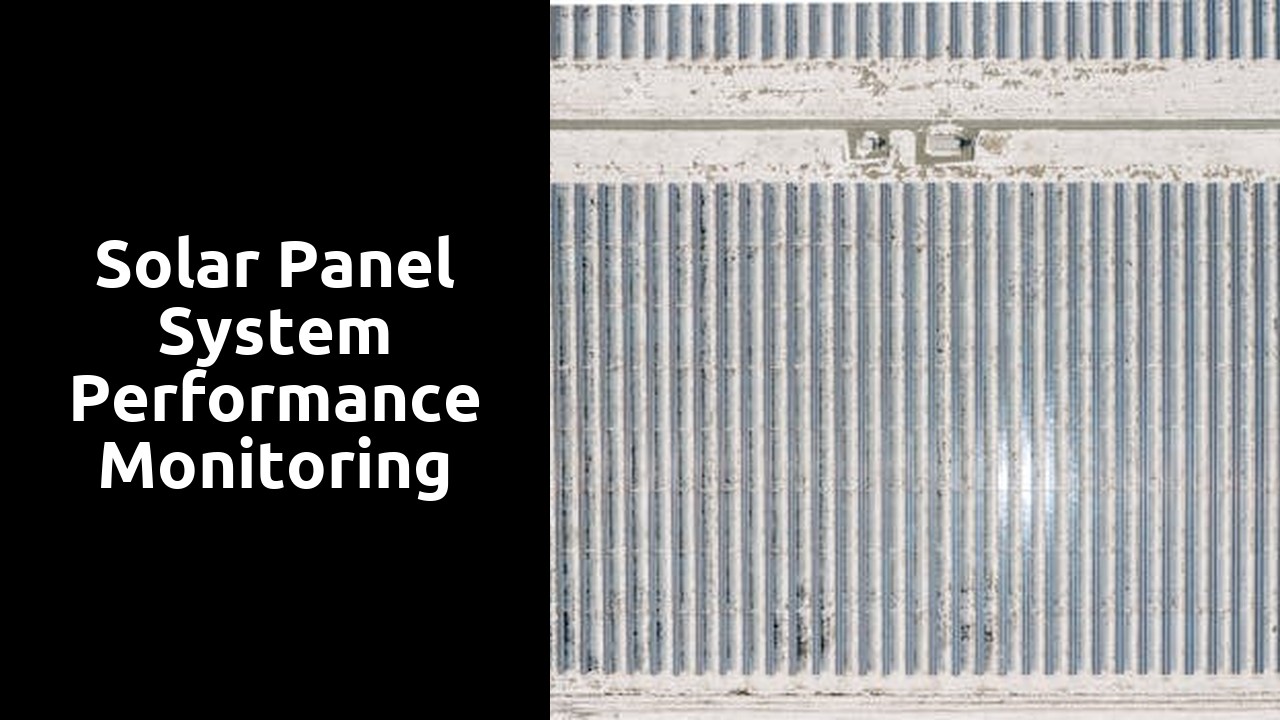
Remote Monitoring Solutions for Solar Panels
Remote monitoring solutions play a crucial role in ensuring the optimal performance of solar panel systems. By utilising remote monitoring technologies, solar panel owners can conveniently access real-time data and insights regarding their system's efficiency and productivity. This allows for prompt action to be taken in case of any performance issues, making the overall management of Solar Panel System Performance Monitoring much more efficient.
Through remote monitoring solutions, individuals can track key metrics such as energy production, inverter performance, and even weather conditions that may impact the system. This proactive approach enables solar panel owners to identify any potential problems early on, leading to improved maintenance practices and ultimately enhancing the overall performance and longevity of their solar panel systems.
Advantages of Realtime Performance Monitoring
Real-time performance monitoring of solar panel systems offers a range of advantages for both residential and commercial users. By receiving instant updates on the performance of your solar panels, you can quickly detect any issues that may arise, allowing for prompt intervention to maximize energy generation. This proactive approach to maintenance can significantly increase the overall efficiency and longevity of your system, ultimately saving you time and money in the long run. Additionally, real-time monitoring provides valuable insights into energy production patterns, consumption trends, and system health, enabling users to make informed decisions to optimize their energy usage and reduce their carbon footprint.
Furthermore, the ability to remotely monitor solar panel system performance offers convenience and peace of mind to users. With access to real-time data through web-based platforms or mobile applications, users can conveniently track the performance of their solar panels from anywhere at any time. This feature is particularly beneficial for property owners who are not always on-site or for businesses with multiple locations, as it allows for centralized monitoring and management of all systems. Overall, real-time performance monitoring is an essential tool for ensuring the effectiveness and reliability of your solar panel system, ultimately enhancing its overall efficiency and performance.
Equipment Needed for Effective Solar Panel Monitoring
To ensure optimal solar panel system performance monitoring, several key equipment pieces are essential. Firstly, a data logger plays a crucial role in collecting and storing data from the solar panels. This device provides real-time information on the solar panel array's performance, allowing for continuous monitoring and analysis. Additionally, a reliable internet connection is necessary to transmit data to the monitoring system efficiently. This connection ensures that data is readily available for analysis and action to improve the overall solar panel system performance monitoring.
Furthermore, inverters are essential components for effective solar panel system performance monitoring as they convert the direct current (DC) produced by the solar panels into usable alternating current (AC). Inverters often come equipped with monitoring capabilities, allowing users to track data such as energy production and system health. By combining these essential equipment pieces, individuals can achieve comprehensive and robust solar panel system performance monitoring, ensuring optimal efficiency and long-term sustainability.
Essential Components of a Monitoring System
When it comes to monitoring the performance of a solar panel system, there are several essential components that play a crucial role in ensuring optimal efficiency. One of the key components is the data acquisition system, which collects real-time data on the operational status of the solar panels. This system typically includes sensors, meters, and communication devices that gather information on factors such as power output, voltage, and current. By continuously monitoring these metrics, it becomes easier to detect any issues or discrepancies in the solar panel system performance.
In addition to the data acquisition system, another essential component of solar panel system performance monitoring is the remote monitoring platform. This software allows users to access and analyse the data collected by the sensors and devices in real-time, from any location. By utilising a remote monitoring platform, solar panel system owners can easily track the performance of their system, identify any potential issues, and make informed decisions to optimise efficiency. By combining these essential components, a comprehensive solar panel system performance monitoring solution can be established, ensuring the long-term effectiveness and sustainability of the solar energy system.
Common Issues in Solar Panel Performance Monitoring
One of the common issues in Solar Panel System Performance Monitoring is data inaccuracies. This can occur due to various factors such as sensor malfunctions, poor connectivity, or interference with the monitoring system. Inaccurate data can lead to incorrect analysis of panel performance, hindering the ability to make informed decisions for maintenance or upgrades. It is crucial to regularly check data accuracy to ensure the reliability of the monitoring system.
Another issue that frequently arises in Solar Panel System Performance Monitoring is communication failures. This can be attributed to network issues, communication protocol errors, or software malfunctions. Communication failures can disrupt the flow of data from the panels to the monitoring system, leading to gaps in data collection and analysis. It is important to address communication issues promptly to maintain the seamless operation of the monitoring system and to ensure accurate tracking of solar panel performance.
Troubleshooting Inverter and Connection Problems
When encountering issues with solar panel performance, troubleshooting inverter and connection problems is crucial for maintaining an effective Solar Panel System Performance Monitoring. Inverters play a vital role in converting the direct current (DC) produced by solar panels into alternating current (AC) that can be used in households or fed back into the grid. In case of a sudden drop in energy production, checking the inverter for any faults or errors is the first step in diagnosing the problem.
Moreover, ensuring that the connections between the solar panels, inverters, and monitoring system are secure and in good condition is essential for accurate Solar Panel System Performance Monitoring. Any loose or faulty connections can lead to data inaccuracies and hinder the overall efficiency of the system. Regularly inspecting the wiring, terminals, and communication links can help in detecting and resolving issues promptly, thereby optimizing the performance of the solar panel system.
FAQS
What is the importance of monitoring solar panel performance?
Monitoring solar panel performance is crucial to ensure optimal energy production, detect any issues early on, and maximize the return on investment in solar energy systems. ####
How can I remotely monitor the performance of my solar panels?
Remote monitoring solutions, such as specialized software or apps, allow you to track real-time data on your solar panel system's performance from anywhere, providing insights and alerts on its efficiency and health. ####
What are the advantages of real-time performance monitoring for solar panels?
Real-time performance monitoring enables you to identify and address issues promptly, optimize energy production, track energy savings, and enhance overall system efficiency. ####
What equipment is essential for effective solar panel monitoring?
Essential equipment includes a monitoring system (hardware and software), inverters, communication devices, sensors, and data loggers to collect and analyze data on solar panel performance. ####
What are the essential components of a solar panel monitoring system?
A monitoring system typically consists of sensors to measure parameters like energy production and system health, communication devices to transmit data, data loggers to store information, and a user interface to display real-time data and alerts. ####
What are some common issues encountered in solar panel performance monitoring?
Common issues include inverter malfunctions, connection problems, shading issues, faulty sensors, communication errors, and data discrepancies, which can impact the efficiency and reliability of solar panel systems. ####
How can I troubleshoot inverter and connection problems in solar panel monitoring?
Troubleshooting inverter and connection problems involves checking for loose connections, resetting the inverter, monitoring communication signals, verifying sensor readings, and consulting with a professional if needed to ensure optimal system performance.
